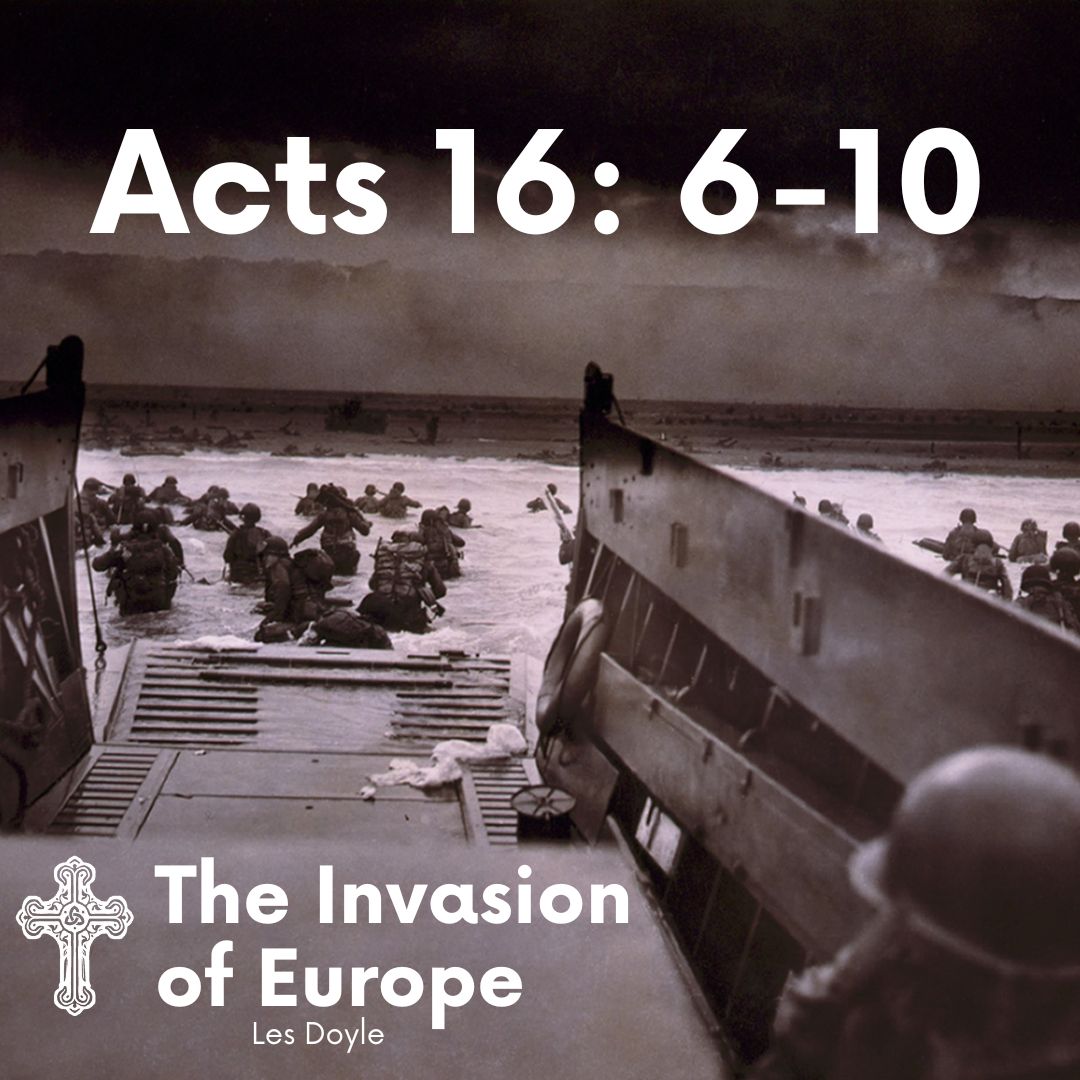Episode Transcript
Legion
Sunday, June 25th, 2023
Christ Covenant Church – Centralia, WA
Mark 4:35-5:20
35 And the same day, when the even was come, he saith unto them, Let us pass over unto the other side. 36 And when they had sent away the multitude, they took him even as he was in the ship. And there were also with him other little ships. 37 And there arose a great storm of wind, and the waves beat into the ship, so that it was now full. 38 And he was in the hinder part of the ship, asleep on a pillow: and they awake him, and say unto him, Master, carest thou not that we perish? 39 And he arose, and rebuked the wind, and said unto the sea, Peace, be still. And the wind ceased, and there was a great calm. 40 And he said unto them, Why are ye so fearful? how is it that ye have no faith? 41 And they feared exceedingly, and said one to another, What manner of man is this, that even the wind and the sea obey him?
5 And they came over unto the other side of the sea, into the country of the Gadarenes. 2 And when he was come out of the ship, immediately there met him out of the tombs a man with an unclean spirit, 3 Who had his dwelling among the tombs; and no man could bind him, no, not with chains: 4 Because that he had been often bound with fetters and chains, and the chains had been plucked asunder by him, and the fetters broken in pieces: neither could any man tame him. 5 And always, night and day, he was in the mountains, and in the tombs, crying, and cutting himself with stones. 6 But when he saw Jesus afar off, he ran and worshipped him, 7 And cried with a loud voice, and said, What have I to do with thee, Jesus, thou Son of the most high God? I adjure thee by God, that thou torment me not. 8 For he said unto him, Come out of the man, thou unclean spirit. 9 And he asked him, What is thy name? And he answered, saying, My name is Legion: for we are many. 10 And he besought him much that he would not send them away out of the country. 11 Now there was there nigh unto the mountains a great herd of swine feeding. 12 And all the devils besought him, saying, Send us into the swine, that we may enter into them. 13 And forthwith Jesus gave them leave. And the unclean spirits went out, and entered into the swine: and the herd ran violently down a steep place into the sea, (they were about two thousand;) and were choked in the sea. 14 And they that fed the swine fled, and told it in the city, and in the country. And they went out to see what it was that was done. 15 And they come to Jesus, and see him that was possessed with the devil, and had the legion, sitting, and clothed, and in his right mind: and they were afraid. 16 And they that saw it told them how it befell to him that was possessed with the devil, and also concerning the swine. 17 And they began to pray him to depart out of their coasts. 18 And when he was come into the ship, he that had been possessed with the devil prayed him that he might be with him. 19 Howbeit Jesus suffered him not, but saith unto him, Go home to thy friends, and tell them how great things the Lord hath done for thee, and hath had compassion on thee. 20 And he departed, and began to publish in Decapolis how great things Jesus had done for him: and all men did marvel.
Prayer
Father, we thank you for the power that is manifest in the Lord Jesus. We thank you for these stories you give us in the gospels, that reveal to us Your compassion, even and especially to those who are afflicted by demons. We ask that you would exorcise in our own day the many evil and unclean spirits that have possessed our nation, arise, and deliver us O Lord, for we ask this in Jesus name, Amen.
Introduction
Well after a long day of teaching the crowds in parables and then explaining those parables to his disciples, evening has finally come. We were told at the beginning of Mark chapter 4 that Jesus “entered into a ship and sat in the sea [while] the whole multitude was on the beach,” and now Jesus is going to send them away and say, “Let us pass over to the other side” (Mark 4:35).
You’ll remember they are on the Sea of Galilee, which is about 64 square miles in size (roughly twice the size of Lake Washington), and Jesus has been preaching and healing and casting out demons in these primarily Jewish towns along the coast.
His custom has been to go into the synagogues and teach on the sabbath days, but his popularity is increasing such that he can hardly go anywhere without huge crowds following him. Therefore, the only place the Lord Jesus has to rest is in the hinder part of a ship.
Now, the way that Mark has arranged this material suggests that if we know how to interpret Jesus’ parables and see in them the mystery of the kingdom, then we will also know how to rightly interpret the real-life “parables” of Jesus’ actions.
Just as the parables forced us to ponder the deeper meaning of seed and soil and lamps and mustard trees and birds, so also Jesus’ actions are themselves packed with significance and invite us to ponder the deeper meaning of storms and ships and swine and demons who drive those swine into the sea.
It is the interpretation of Jesus’ parables that should prepare us now to interpret Jesus’ actions. And so even though we are not reading parables anymore, you should still be thinking about what these now real historical events signify. What do Jesus’ actions teach us about the kingdom of God?
Outline
There are two major scenes in our text:
In verses 35-41 of chapter 4, Jesus brings peace to a stormy sea.
In verses 1-20 of chapter 5, Jesus brings peace to a demon-possessed man.
Mark has intentionally set these two scenes next to each other for us to compare and contrast, and so despite this being quite a long sermon text, it’s important for us to study them together.
The Calming of the Storm
Verses 37-39
37 And there arose a great storm of wind, and the waves beat into the ship, so that it was now full. 38 And he was in the hinder part of the ship, asleep on a pillow: and they awake him, and say unto him, Master, carest thou not that we perish?
Notice first that the ship is full of water, “the waves beat into the ship so that is was now full.” The ship is probably starting to sink. And yet somehow, Jesus is asleep on a pillow. His body is probably soaking wet, and we presume his head at least is propped up out of the water so he can still breathe.
The disciples of course are afraid they are going to drown, and so they wake Jesus up. And what do they say to him? They say to him what all of us have probably said to God at some point or another: “Lord, don’t you care about me? Don’t you see what is happening? Do you not care that I am suffering? I though you loved me?” “Carest thou not that we perish?!”
You can almost hear the frustration and annoyance in the disciples’ voice. Why won’t you do something?
This is a good question to ask, but before we see how Jesus responds, I want us to zoom out for a moment and think about how this scene might be similar to other stories in the Bible, because that is going to help us penetrate to God’s intention for giving us this miracle in the first place. Of all the things that Jesus did, why give us this story in this context?
So think for a moment and ask yourself, has anything like this ever happened before in the Bible? Are there any similar stories with boats and water and storms?
Perhaps the first instance we think of is Noah’s ark. Noah’s ark is the first boat to appear in the Bible and it is used to survive a great storm (a flood of God’s judgment).
This motif of an ark saving us through water, the Apostle Peter says is a picture of baptism (1 Pet. 3:20-21), baptism being a kind of death and resurrection, a rebirth through water.
When we come to the book of Exodus, we see that baby Moses is saved by a miniature ark (תֵּבָה), a basket of reeds that helps him escape Pharoah’s persecution of the Hebrew boys. Ironically Moses then becomes Pharaoh’s adopted grandson.
This salvation through water that Moses experiences is itself a foreshadowing of when he will lead the nation of Israel through the Red Sea. What do you do when you need to cross a body of water but don’t have a ship? God splits it in two. The Exodus from Egypt is another Noah’s Ark moment. There is a flood of judgment on Egypt, plagues, and destruction, but Israel is saved through water. The Exodus is a second Noah’s Ark.
And then finally we must not forget the story of Jonah. Jesus will later tell the Pharisees that the only sign they will be given is the sign of Jonah, and in this story of Jesus sleeping in a storm, we have many parallels with the Jonah story, I’ll mention just a few:
Jonah is commissioned by God to preach repentance to the Gentiles, God sends him to the Assyrian capital of Nineveh, but Jonah goes the other direction.
Where is Jesus going in our text? He is going to the Gentile regions of Galilee, to the Gadarenes, to the Decapolis, where there are pigs and tombs, and other unclean things that were an abomination to the Jews. Jonah refuses to go to them, Jesus chooses to go to them.
Both of them get on ships, both ships are caught in a great and life-threatening storm, and both are asleep while it happens.
Both Jonah and Jesus are awakened by a frantic and fearful crew.
And then we start to see some important dissimilarities between these two stories.
In order for Jonah to calm the storm, what must happen? He must die, the sailors must cast him into the sea. Jonah 1:15 says, “So they took up Jonah, and cast him forth into the sea: and the sea ceased from her raging. Then the men feared the Lord exceedingly, and offered a sacrifice unto the Lord, and made vows.”
The miraculous calming of the storm after Jonah’s death, is what converts these Gentile sailors, “they feared the LORD exceedingly.”
Now what does Jesus do to calm the storm?
Verses 39-41
39 And he arose, and rebuked the wind, and said unto the sea, Peace, be still. And the wind ceased, and there was a great calm. 40 And he said unto them, Why are ye so fearful? how is it that ye have no faith? 41 And they feared exceedingly, and said one to another, What manner of man is this, that even the wind and the sea obey him?
In Scripture and in every other world religion, everyone knows that the weather is outside of man’s control.
The pagans would offer sacrifices to various deities in hopes that the god of rain, or the god of sun would be favorable to them and cause their crops to grow. If there was a drought, the deity must be angry. If there was an abundance of harvest, the deity must be pleased. But in either case, the pagan mind knows that only God controls the weather.
Therefore, what could be a more obvious sign of a man’s deity, than that he can bring instant calm to a deadly storm? And unlike Jonah, or Elijah, or Moses, or any other great prophet, Jesus does not pray to God, he does not ask for God to save them, but rather, He Himself just rebukes the wind like a father rebukes his son, and says, “Peace, be still” and the wind and the sea obey him.
Gentiles know that only God has this kind of power, it was what converted the sailors on Jonah’s ship. And the Jews likewise have many passages in Holy Writ that say the same.
Psalm 107:23-31 reads almost like a prophesy of this event, “They that go down to the sea in ships, That do business in great waters; These see the works of the Lord, And his wonders in the deep. For he commandeth, and raiseth the stormy wind, Which lifteth up the waves thereof. They mount up to the heaven, they go down again to the depths: Their soul is melted because of trouble. They reel to and fro, and stagger like a drunken man, And are at their wits’ end. Then they cry unto the Lord in their trouble, And he bringeth them out of their distresses. He maketh the storm a calm, So that the waves thereof are still. Then are they glad because they be quiet; So he bringeth them unto their desired haven. Oh that men would praise the Lord for his goodness, And for his wonderful works to the children of men!”
There is only person who can “maketh the storm a calm, so that the waves thereof are still.” And that is the LORD. Who then is this Jesus?
Proverbs 30:4 asks the same question, “Who has ascended into heaven, or descended? Who has gathered the wind in His fists? Who has bound the waters in a garment? Who has established all the ends of the earth? What is His name, and what is His Son’s name, If you know?”
What Solomon pondered in Proverbs and what the Jews sang in Psalms; Jesus comes to answer. The LORD Jesus is his name.
Mark leaves the question hanging in the disciples’ mouth, “What manner of man is this, that even the wind and the sea obey him?” And for us who know the answer to the question, we are given a deep insight into the ways of God and why He does what He does.
If you were one of the twelve disciples on that ship, who lived through this miracle, and pondered this scene after Jesus resurrection, what you would conclude is that, because Jesus is God, according to His divine nature, He was the one who caused that storm in the first place, just like Psalm 107 says, “He commandeth, and raiseth the stormy wind.”
And therefore, if Jesus has the power to both cause the storm and make it to cease, then He must have had some greater purpose for bringing us to the point of almost perishing. What was the purpose for Jesus sending the storm?
Well, there are at least two reasons for Jesus doing this:
1. First, Jesus wants us to know that there is nothing that touches us, that does not first pass through the hands of Almighty God. Just as Satan could not touch or harm Job unless God gave him permission, so also there is no storm that can harm us unless God permits it.
The wind may be tempestuous, our boat may be filling with water, but Jesus says, even if you are executed, “there shall not an hair of your head perish” (Luke 21:18), and “a sparrow does not fall to the ground apart from your Father’s will…and you are of far more value than sparrows.”
Nothing touches the disciples, and nothing touches us that does not first pass through the hands of God. And if God permits it, then we can be at peace knowing our Father knows what is good for us. Sometimes a storm is just what we need.
2. Second, Jesus wants us to know that He is always with us in the ship. Jesus could have stayed awake in the storm if he wanted to (if he fasted for 40 days, he can certainly keep himself awake for a few hours if he wants), but he chose to go to sleep. Why did he do this?
He did this first to reveal that he was truly human (that he was fully man with a true human body that wanted rest), but he did this also to test the disciples’ faith, to bring them to a point of crisis wherein they would cry out for deliverance.
You see while Jesus was sleeping according to his human nature, He was at the very same time according to His divine nature wholly present and awake and ready to save as soon as they called out.
As it says in Psalm 121:4, “Behold, He who keeps Israel Shall neither slumber nor sleep.”
And again in Psalm 34:15, “The eyes of the Lord are upon the righteous, And his ears are open unto their cry.”
Jesus wants the disciples and all of us to know, that the trying of our faith is how God increases our faith. Just as you need heavier weights to build stronger muscles, so also the LORD gives us more difficult tests to increase our reliance upon Him.
1 Peter 1:6-8 summarizes the lesson of this miracle saying, “In this you greatly rejoice, though now for a little while, if need be, you have been grieved by various trials, that the genuineness of your faith, being much more precious than gold that perishes, though it is tested by fire, may be found to praise, honor, and glory at the revelation of Jesus Christ, whom having not seen you love. Though now you do not see Him, yet believing, you rejoice with joy inexpressible and full of glory.”
God sends his church like a ship into the storm, so that calling upon Him in the time of trouble, He might answer, and give to us that Divine tranquility and peace which surpasses understanding.
Now if this first miracle demonstrates Christ’s power over earthly and external forces (the powers of nature), this next miracle reveals Christ’s power over spiritual and interior forces (the powers of evil).
The Exorcism of Legion
Verses 1-20, I will summarize this story for us.
Having calmed the storm, Jesus and his disciples arrive at the other side of the sea. And lo, their destination was the country of the Gadarenes (a Gentile region with pig farmers nearby). Mark says in verse 2 that “immediately there met him out of the tombs a man with an unclean spirit.”
We are then told in verses 3-5 that “no man could bind him, no not with chains,” and “always, night and day, he was in the mountains, and in the tombs, crying, and cutting himself with stones.”
So, this demon-possessed man is about as far from the kingdom of God as a man can get. If ever there was someone who was “unredeemable,” unclean, and “untouchable,” it was this man.
According to the law of God, “He who touches the dead body of anyone shall be unclean seven days” (Num. 19:11). This man lived amongst the dead.
According to the law of God, “the swine, because it divideth the hoof, yet cheweth not the cud, it is unclean unto you: ye shall not eat of their flesh, nor touch their dead carcase” (Deut. 8:8). This man lived near thousands of filthy swine.
According to the law of God, “You shall not make any cuttings in your flesh for the dead…I am the Lord” (Lev. 19:28). This man cut himself with stones constantly.
And yet, Mark tells us in verse 6…
Verses 6-7
6 But when he saw Jesus afar off, he ran and worshipped him, 7 And cried with a loud voice, and said, What have I to do with thee, Jesus, thou Son of the most high God? I adjure thee by God, that thou torment me not.
So this man seeing Jesus and running towards him, falls before him prostrate, and then we hear the voice of the demon speaking through him, “I adjure thee by God, that thou torment me not.”
Jesus then asks for his name, and the demon responds (in verse 9), “saying, My name is Legion: for we are many.”
This name Legion is a Roman military term and suggests that there are many thousands of demons inside of this one man. A Roman legion was approximately 6,000 soldiers, and although we are not given an exact number of demons here, we hear from their own mouth that “we are many.”
So, Jesus commands this Legion to “come out of the man” and in verse 12 it says, “all the devils besought him, saying, ‘Send us into the swine, that we may enter into them.’”
Jesus permits them to go into the swine, and verse 13 says, “and the herd ran violently down a steep place into the sea, (they were about two thousand;) and were choked in the sea.”
The same sea that threatened to drown the disciples and their ship, becomes the graveyard for God’s enemies. This was true in the days of Noah and the flood, this was true when Israel crossed the Red Sea and saw the Egyptians dead upon the seashore,and it is true when a legion of demons face off against the Messiah.
Remember what Jesus said to the scribes from Jerusalem back in chapter 3, when they accused him of casting out devils by the prince of the devils. Jesus said, “No man can enter into a strong man’s house, and spoil his goods, except he will first bind the strong man; and then he will spoil his house.”
Well, this is the strong man. This is the one that no one could tame. This is thousands of demons going against Jesus. And the best they can do is beg and parley to be sent into the swine. And when they do they go rushing down into the watery abyss. The devil is no match for the Lord Jesus, not even when there are legions of demons.
There are many many lessons here.
We could reflect upon the nature of demonic power and its suicidal tendencies.
We could ponder why it is the pigs drowned, despite the fact that most pigs can swim.
We could reflect upon how Jesus regards one man’s soul as worth more than the lives of 2,000 pigs, the men and animals are not of equal value. These are all good questions to ponder.
But I draw your attention to what Jesus wants this man to go away with, and that is: the great compassion that God has shown him.
There are two different responses Mark records for us after this exorcism.
The first is from the people who fed the swine and lived in the city, verse 17 says, “And they began to pray him to depart out of their coasts.” They want Jesus to leave.
Whether this was because they had suffered a great financial loss by the death of 2,000 pigs and didn’t want any more trouble. Or because they knew themselves unworthy to have Jesus amongst them, like Peter said, “Depart from me; for I am a sinful man, O Lord.” We are not told their reasons. Whatever the case, they want Jesus to depart out of their coasts. That’s the first response.
The second response is from the man who was delivered. We are never told what his name is (in any of the gospel accounts), and there is a reason for that. But this man responds by asking to follow Jesus. Verse 18 says, “he that had been possessed with the devil prayed him that he might be with him.”
This man went from violent and wild and running naked in the tombs, to “sitting and clothed in his right mind.” And the one whose mind has been made right by the Lord Jesus, wants nothing more than to be with Jesus. That is what right reason moves the will to do.
However, Jesus does not allow him to join The Twelve. Verse 19 says, “Howbeit Jesus suffered him not, but saith unto him, Go home to thy friends, and tell them how great things the Lord hath done for thee, and hath had compassion on thee.” And then verse 20 closes with, “And he departed, and began to publish in Decapolis how great things Jesus had done for him: and all men did marvel.”
Not all are called to be apostles, but all of us are free to go home and tell our family and friends, to publish in all the places we travel, how great things Jesus has done for us. How he has had compassion upon us.
The truth is that apart from the grace of God, any one of us could be that wild man, naked, possessed, cutting ourselves, and living amongst the dead. Perhaps some of you have faced or are still facing those same self-destructive temptations and behaviors.
The same evil that possessed this man by the thousands, is very much at work in our own day. Just look at the sexual perversity and insanity around us, the grooming of children to cut off their private parts and choose their own gender. This whole abomination called “Pride Month” where people boast in their shame, and flaunt their iniquity, and demand our approval for wicked and unclean acts.
What other name is there for this but demonic?
Our nation and our culture and many many churches, have become synagogues of Satan. They have become unclean places where demons are invited to take up residence.
And unless Christ has compassion upon us, we will die in our sins. We will jump off a cliff and drown ourselves like wretched swine.
This story is meant to warn us about where sin and unrepentance leads. It leads to the abyss. It leads to the same place where devils are punished and tortured for eternity.
This story is also meant to give us hope. That Christ is a compassionate God, and is willing to go out of his way, to cross the sea into unclean places to deliver us.
Conclusion
So take heed what you hear and see in these miracles. See in them that Jesus is wholly divine, and that He wields His divinity always for the good of His people. See in the face of the Lord Jesus, the power and love and compassion of God. And then fall down and worship Him. Pray that you might be with him. For he will clothe you, and make you to sit down him with in heavenly places, giving you the mind of Christ.




